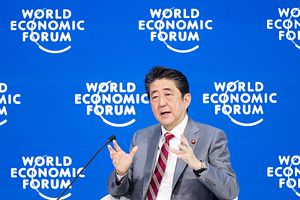With vast amounts of data being created every day, Japanese Prime Minister Shinzo Abe has declared that the next G-20 summit should wrestle with how to manage that digital information. In doing so, he argued that the engine for economic growth was “fueled no longer by gasoline, but more and more by digital data.”
Abe has previously indicated that the G-20 summit, to be held in the Japanese city of Osaka in June, should devote time to tackling climate change. Now he has nominated data governance as another “big issue” to be addressed.
“I would like Osaka G-20 to be long remembered as the summit that started worldwide data governance,” Abe said in an address to the World Economic Forum’s annual meeting in Davos on January 23. Referring to the World Trade Organization, he added: “Let Osaka G-20 set in train a new track for looking at data governance – call it the Osaka Track – under the roof of the WTO.”
In the coming decades, digital data would be driving the economy forward, Abe said. He underlined the urgency of the discussion in the following terms:
We had better act now, because coming into being every single day is more than 2.5 quintillion bytes of data, which is, according to one estimate, as much as 250,000 time the printed material in the U.S. Library of Congress. A delay of one year means we will be light years behind.
Abe noted that the debate would have to balance competing demands: The need to protect intellectual property (IP), personal data, and national security intelligence on one side, while at the same time enabling “the free flow of medical, industrial, traffic and other most useful, nonpersonal, anonymous data to see no borders, repeat, no borders.”
Abe’s push comes amid increasing attention on the boom in data kept by governments and tech companies around the world – and how to best protect that information. Chinese venture capitalist Kai-Fu Lee recently boasted that data was the new oil and China was “the new Saudi Arabia.”
IP protection looms as a particularly sensitive issue in the data governance talks. The United States and others have long accused China of adopting unfair trading practices including IP theft and forced technology transfer. The claims have been raised as part of the U.S.-China trade dispute.
In a blistering speech in October, U.S. Vice President Mike Pence vowed to “continue to take action against Beijing until the theft of American intellectual property ends once and for all.” While Chinese officials dismissed such claims as “hearsay,” Beijing recently announced plans to toughen penalties for IP theft.
Abe, however, appeared to be attempting to make an inclusive pitch to fellow world leaders with his speech in Davos. The prime minister said it would be great “if every one of us, from the U.S., Europe, Japan, China, and India, to leap-frogging countries in Africa, share our efforts and our successes in breathing fresh life into the WTO.”
He contended that when people talked about changing the WTO, they often were still thinking about goods like agricultural products for which borders and distances mattered. People had not yet caught up with the new reality that “data drives everything.”
Abe voiced his support for a model called Data Free Flow with Trust (DFFT), emphasizing that it applied to nonpersonal data. He said this proposal “should top the agenda in our new economy” and argued the benefits could be substantial:
In Society 5.0, it is no longer capital but data that connects and drives everything, helping to fill the gap between the rich and the less privileged. Services of medicine and education, from elementary to tertiary, will reach small villages in the sub-Saharan region. Girls who have given up going to school will see, beyond their own village, a wider horizon where the sky is the limit. Our task is obvious. We must make data a great gap buster.
He envisaged that this data-driven society would also utilize artificial intelligence (AI), the internet of things, and robotics, potentially making cities “much more livable for all sorts of people from all walks of life.”
Abe wasn’t the only speaker at Davos to address data governance issues. Microsoft chief executive officer Satya Nadella called for new global norms on data, privacy and AI. Nadella cited Europe’s General Data Protection Regulation (GDPR) as “a fantastic start in treating privacy as a human right” and he hoped the U.S. followed suit and ultimately the world converged on a common standard.

































